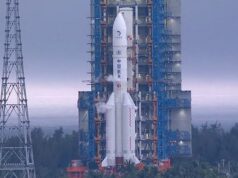In 2015 Barack Obama signed an agreement with Iran to ease various restrictions on Iran in exchange for stopping its nuclear quest. All this has been negated by Trumps latest unilateral sanctions against Iran coming into effect on 05 Nov 18. US Secretary of State Mike Pompeo called this “the toughest sanctions ever put in place on Iran”, Iran’s President Hassan Rouhani said the Islamic republic “will proudly bypass sanctions”.
Americans think that these fresh restrictions will stop all Iranian oil exports, shipping and banking activities — all core parts of the Iranian economy. Trump has also threatened that it will also sanction all companies from third countries doing business with Iran.
However both India and China just declared that they will not be guided by any such unilateral actions of any country whatsoever. Since it is not a UN approved sanction they are continuing with their oil import from Iran, as per their requirement.
India, imports over 17 per cent of its oil from Iran, and any disruption of oil is going to effect its economy, therefore it has rightly decided to ignore any such American sanctions. After all in 1998, these Chaps had also imposed similar sanctions on India itself, when India had forcefully kicked open the door of the Nuclear Club and entered uninvited.
The restoration of American sanctions is part of a wider effort by US President Donald Trump to force Iran to curb its nuclear and missile programs as well as its support for proxy forces in Yemen, Syria, Lebanon and other parts of the Middle East. Calling the Obama-era sanctions “defective to the core”, Trump pulled out of the agreement in May. The deal was been signed alongside the UK, France, Germany, China and Russia, and was endorsed by the UN Security Council. The European Union, France, Germany and Britain said in a joint statement that they regretted the US decision and would seek to protect European companies doing legitimate business with Tehran.
India, is the second biggest buyer of Iranian oil after China. Therefore India and Iran are working on a rupee-based payment arrangement with UCO Bank and Bank Pasargad. Using this mechanism, India will continue importing its required amount of oil, as it pleases. During the previous sanctions regime of USA, India had adopted a barter-like scheme to buy oil from Iran while the Middle Eastern country used rupees to import goods from India.
China has totally denounced the new US sanctions as “long-arm jurisdiction” and vowed to continue its bilateral trade with the Islamic republic. “China opposes unilateral sanctions and long-arm jurisdiction. We believe that China’s normal cooperation (with Iran) within international law is legal and legitimate, and this shall be respected,” Foreign Ministry spokeswoman Hua Chunying said.
Iran has vowed to break US sanctions and denounced it as an “economic war”. Iranian President Hassan Rouhani vowed to continue selling its crude oil in the international market despite the measures. “We should break the sanctions very well and we will do that.” Calling the US a “bullying power”, Rouhani said Trump was against the law and international conventions. “We are in a situation of economic war, confronting a bullying power. I don’t think that in the history of America, someone has entered the White House who is so against law and international conventions,” he said.
On Sunday, thousands of Iranians rallied in Tehran to mark the 39th anniversary of the US Embassy takeover. The crowd chanted “Down with US” and “Death to Israel” during the rally in the capital as anger and distrust surged against America.
Iran is the third-largest producer of oil among the Organization of the Petroleum Exporting Countries (OPEC). In 2018, Iran exported about 2.7 million barrels per day. Though through its sustained pressure, the US has managed to reduce Iran’s oil exports from 2.7 million to 1.6 million barrels a month. Oil is the main source of income for Iran. Thus this sanctions come at a time when Iran is already in the grip of an economic crisis. The rial now trades at 145,000 to $1, compared with 40,500 to $1 a year ago. The economic chaos prompted mass anti-government protests at the end of last year that resulted in nearly 5,000 reported arrests and at least 25 people being killed.
In addition, the Brussels-based Swift network for making international payments is expected to cut off links with targeted Iranian institutions, isolating Iran from the international financial system. The measures will mainly affect Iranian companies in direct business with other foreign firms. Saudi Arabia, the leading player of the OPEC committee, has said that it would fill in for the lost supply.
Quite aware of the response of countries like India and China, who cannot be dictated by any rouge nation of any variety, the Trump administration has again “UNILATERLY GRANTED EXEMPTION “ to eight countries to continue importing Iranian oil since they have made “significant reductions” in oil imports. This list issued by USA mentions Japan, South Korea, Italy, Greece, Taiwan, Turkey and of course China and India.
This kind of laughable action gets further magnified when a Cabinet Minister like Pompeo says that countries like India, granted exemption, would be asked to bring down oil imports from Iran to zero in six months. He also said that Countries that get waivers under the revived sanctions must pay for the oil into escrow accounts in their local currency. That means the money won’t directly go to Iran, which can only use it to buy food, medicine or other non-sanctioned goods from its crude customers. The administration sees those accounts as an important way of limiting Iranian revenue and further constraining its economy.
Americans may get a rude shock when BRICS and other such groupings decide to carry out their international trading with Yuan as the main currency and thus giving a solid kick to the current international banking system.



